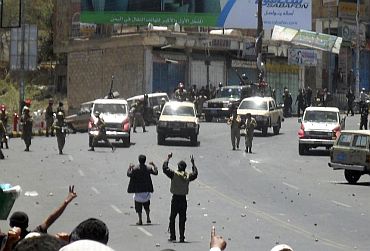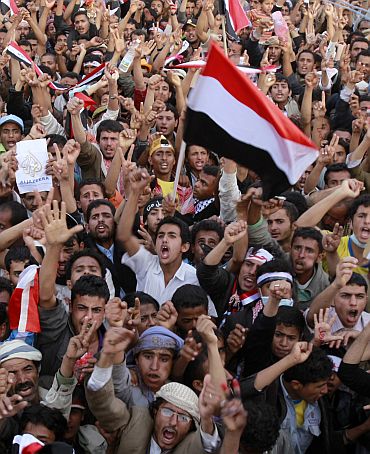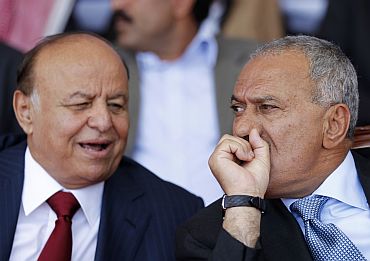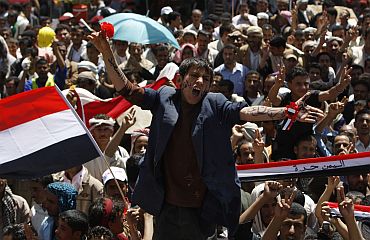
Yemen came close to the brink on Monday as security forces shot dead 17 people among the thousands of anti-regime protesters who stormed the Governor's headquarters in the city of Taiz, and the United States appeared to be distancing itself from longtime ally Abdullah Ali Saleh.
Taiz, 200 kms south of capital Saana, witnessed another bloody day after demonstrators who raided the courtyard of the governorate were targetted by plainclothes policemen.
The bloodshed sent the death toll in the violence wracked country to more than 120. The developments came amid reports that the US is pulling off its backing of the beleaguered President who is likely to be eased out and offered a safe passage.
Please click NEXT to read further..

In Washington, White House spokesperson Jay Carney warned that Al Qaeda may take advantage of the vacuum in the country.
"That is one of the reasons why we urge political dialogue to take place and a timetable for this transition that President Saleh has talked about to be begun," he said.
In the capital Sanaa, military soldiers had a face-off with the police. Troops loyal to general Ali Mohsin, who has sided with the anti-regime protesters barred police from storming demonstrators camping at a square in central Saana.
In the tense face-off, Al Jazeera quoting youth activists said the police backed off.
Violence escalated in the country -- torn apart by Houthi Shia rebellion in the south, rising Al Qaeda terrorism in parts of north and widespread anti-government protests -- as thousands of demonstrators attempted to rush and occupy the governorate at Taiz.

Witnesses said security forces and plainclothes gunmen opened fire on the protesters, killing 17 people on the spot and injuring 100 others.
"At least 17 people were killed by live bullets and hundreds lay wounded as troops on nearby rooftops opened fire with live ammunition," opposition activists were quoted as saying by Al Jazeera.
There were also reports of regime loyalists in civilian clothes firing on protesters in Hudeida, west of Saana.
As violence continued to inflame the strategically located country on the Red sea, a US media report said the American government had dropped its backing to the beleaguered President and was helping to negotiate his exile in another country with members of his family.
New York Times quoting the US and Yemeni officials said that Washington had almost finalised a deal to replace Saleh by his deputy Abd al-Rab Mansur al-Hadi.

The change of regime -- the third in an Arab country after Egypt and Tunisia -- was also backed by Gulf monarchies and the country's closest ally and banker Saudi Arabia.
The Gulf foreign minister who met in Saudi capital of Riyadh in a statement said, "Gulf Cooperation Council have agreed to begin contact with the Yemeni government and opposition to overcome the current situation."
The GCC supported the moves to work out a negotiated agreement to overcome the status quo. Their mediation offer comes a day after Yemen's opposition told the beleaguered President to hand over power to his deputy, whom they would accept as an interim president till fresh elections are held.
The GCC also said in a significant statement that the "will and choices of the Yemeni people should be respected."
The meeting was attended by Saudi Arabia, Bahrain, Kuwait, Oman, Qatar and the UAE - all GCC members.